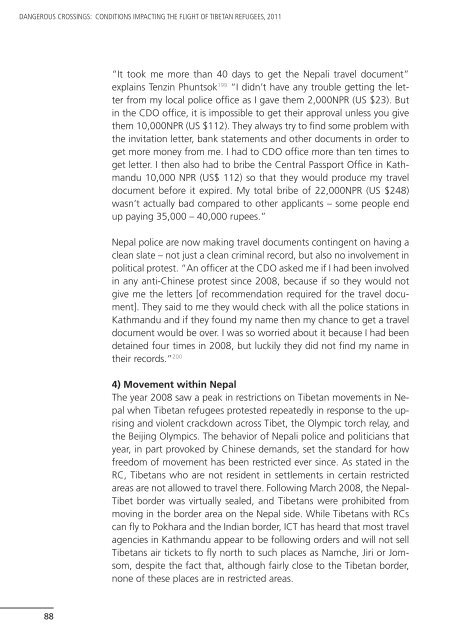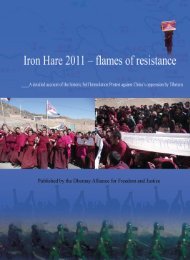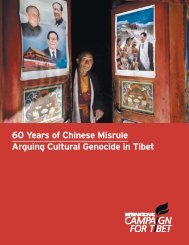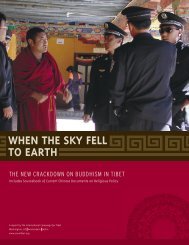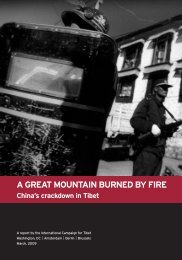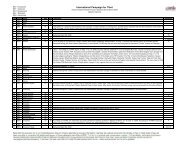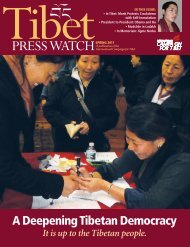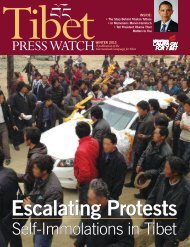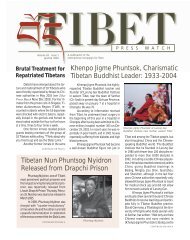DANGEROUS CROSSING: - International Campaign for Tibet
DANGEROUS CROSSING: - International Campaign for Tibet
DANGEROUS CROSSING: - International Campaign for Tibet
Create successful ePaper yourself
Turn your PDF publications into a flip-book with our unique Google optimized e-Paper software.
<strong>DANGEROUS</strong> <strong>CROSSING</strong>S: CONDITIONS IMPACTING THE FLIGHT OF TIBETAN REFUGEES, 2011<br />
88<br />
“It took me more than 40 days to get the Nepali travel document”<br />
explains Tenzin Phuntsok 199 “I didn’t have any trouble getting the letter<br />
from my local police office as I gave them 2,000NPR (US $23). But<br />
in the CDO office, it is impossible to get their approval unless you give<br />
them 10,000NPR (US $112). They always try to find some problem with<br />
the invitation letter, bank statements and other documents in order to<br />
get more money from me. I had to CDO office more than ten times to<br />
get letter. I then also had to bribe the Central Passport Office in Kathmandu<br />
10,000 NPR (US$ 112) so that they would produce my travel<br />
document be<strong>for</strong>e it expired. My total bribe of 22,000NPR (US $248)<br />
wasn’t actually bad compared to other applicants – some people end<br />
up paying 35,000 – 40,000 rupees.”<br />
Nepal police are now making travel documents contingent on having a<br />
clean slate – not just a clean criminal record, but also no involvement in<br />
political protest. “An officer at the CDO asked me if I had been involved<br />
in any anti-Chinese protest since 2008, because if so they would not<br />
give me the letters [of recommendation required <strong>for</strong> the travel document].<br />
They said to me they would check with all the police stations in<br />
Kathmandu and if they found my name then my chance to get a travel<br />
document would be over. I was so worried about it because I had been<br />
detained four times in 2008, but luckily they did not find my name in<br />
their records.” 200<br />
4) Movement within Nepal<br />
The year 2008 saw a peak in restrictions on <strong>Tibet</strong>an movements in Nepal<br />
when <strong>Tibet</strong>an refugees protested repeatedly in response to the uprising<br />
and violent crackdown across <strong>Tibet</strong>, the Olympic torch relay, and<br />
the Beijing Olympics. The behavior of Nepali police and politicians that<br />
year, in part provoked by Chinese demands, set the standard <strong>for</strong> how<br />
freedom of movement has been restricted ever since. As stated in the<br />
RC, <strong>Tibet</strong>ans who are not resident in settlements in certain restricted<br />
areas are not allowed to travel there. Following March 2008, the Nepal-<br />
<strong>Tibet</strong> border was virtually sealed, and <strong>Tibet</strong>ans were prohibited from<br />
moving in the border area on the Nepal side. While <strong>Tibet</strong>ans with RCs<br />
can fly to Pokhara and the Indian border, ICT has heard that most travel<br />
agencies in Kathmandu appear to be following orders and will not sell<br />
<strong>Tibet</strong>ans air tickets to fly north to such places as Namche, Jiri or Jomsom,<br />
despite the fact that, although fairly close to the <strong>Tibet</strong>an border,<br />
none of these places are in restricted areas.


